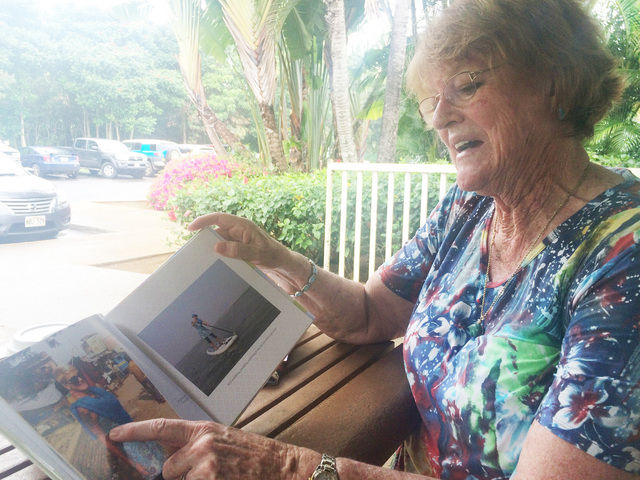In 2011, Michele Frazier Baldwin broke the women’s world record for stand up paddle boarding with a 25-day, 700-mile trek down India’s Ganga River.
And that wasn’t the 45-year-old’s goal.
Four months earlier, Baldwin had been diagnosed with stage four cervical cancer and had been given between three and six months to live.
Her mission that October was to draw attention to the preventable cancer and, in doing so, save lives through her death.
She died on Feb. 5, 2012, but her memory lives on through two documentaries, “Paddling the Ganges” and “Lady Ganga,” as well as her family, particularly her mother, Ruth Frazier.
Frazier landed in Kauai for a vacation in February after telling her daughter’s story to the United Nations at their World Cancer Day meeting on Feb. 4.
“Michele named herself ‘Lady Ganga,’” Frazier said with a laugh. “When she got done with her trip she joked, ‘Who is Lady Gaga (the famous pop singer), just call me Lady Ganga.’”
Frazier said having her daughter’s story broadcast at the U.N. was amazing.
“Michele’s daughter spoke and told them that in the four years that her mother had died, more than one million women had died of cervical cancer,” Frazier said. “She told them to think about how many families that affects.”
Though she’s kicking her feet up here on the island, the New Mexico native isn’t taking a break from spreading her daughter’s message. Frazier said everywhere she goes, her goal is to tell Michele’s story.
That story begins in Crested Butte, Colorado, about three years before she died. The mother of three was “taking care of everybody else, except herself,” Frazier said.
“Just like most women, Michele was making sure her kids and husband were up to date on their exams, shots, and all that,” Frazier said. “Making sure the people she loved were healthy, and she wasn’t taking care of herself.”
Baldwin was diagnosed with cervical cancer and went through two rounds of chemo, radiation and surgery before getting word that the cancer had returned for a third time.
She wanted a final adventure.
“She told me that she had this wild idea to paddleboard down the first half of the Ganga, from the headwaters to Varanasi, which is a holy city for the Buddhists and was really special to her,” Frazier said.
It took six weeks to arrange the details for Baldwin’s trip.
“When we got there, she and the camera guy found a used canoe and someone to paint it up all pretty, it and then we were off,” Frazier said. “Michele did all the Tibetan prayers for the dying while she was paddling.”
Frazier followed her daughter in a van on land.
As they were trekking down the famous river, Frazier said it was impossible not to hope for a miracle of healing, and she said her daughter claims she did receive healing.
“It became very clear to me that I’d been completely healed,” Baldwin says in the “Lady Ganga” video. “That healing, though, is not incompatible with death.”
She died 10 weeks after returning home.
According to the Centers for Disease Control, cervical cancer used to be the leading cause of cancer death for women in the United States, but numbers have gone down in recent years because women are getting more routine Papanicoloau, or Pap tests.
Still, the CDC estimates nearly 12,000 new cases of HPV-associated cervical cancer are diagnosed in the U.S. each year.
The Mayo Clinic recommends a Pap test, along with a test for HPV, be completed every three years for women ages 21-65.
A vaccination is also available for HPV. The CDC recommends both boys and girls, ages 11-12, be vaccinated. For those who didn’t receive the shots when they were younger, it’s recommended to get the shot before they turn 26.
Baldwin, who dabbled in everything from real estate to health care, knew better, Frazier said. But she still let 10 years go by before getting a routine Pap test.
“If she would have kept up to date on the Pap test, we maybe could have caught it earlier,” Frazier said. “This cancer is preventable and the test is relatively easy.”
That message is the one that Frazier is intent upon spreading.
“The message is: Men, take care of your women and children, and women, take care of yourselves,” Frazier said. “And do what you love. Michele always did what she loved.”







